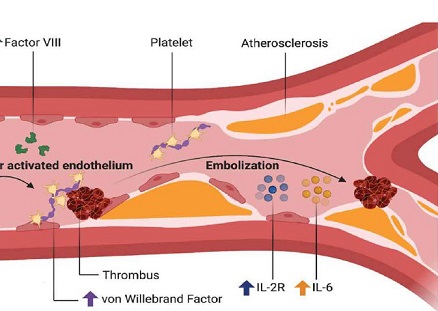Nikhil Prasad Fact checked by:Thailand Medical News Team Jun 19, 2024 10 months, 1 week, 10 hours, 4 minutes ago
Medical News: Stroke is a severe medical condition where blood flow to the brain is interrupted, causing brain cells to die. This can lead to various complications, including cognitive disorders. Cognitive disorders affect memory, thinking, and the ability to perform everyday tasks. A significant number of stroke patients already have cognitive problems before experiencing a stroke. The big question researchers are trying to answer is whether these pre-existing cognitive issues are due to degenerative diseases like Alzheimer's or vascular problems related to the health of blood vessels.
 Link Between Blood Vessel Health and Memory Issues in Stroke Patients
The Study: Exploring Blood Vessel Health and Cognitive Issues
Link Between Blood Vessel Health and Memory Issues in Stroke Patients
The Study: Exploring Blood Vessel Health and Cognitive Issues
A team of researchers from the University of Lille in France conducted a study to investigate whether the health of blood vessels, known as endothelial function, is linked to cognitive problems in stroke patients. Endothelial dysfunction happens when the inner lining of blood vessels doesn't work properly, leading to poor blood flow and inflammation. This study covered in this
Medical News report aimed to see if stroke patients with pre-existing cognitive issues also had signs of endothelial dysfunction.
Methodology: How the Study Was Conducted
The study involved 86 stroke patients, with an average age of 63.5 years. The patients were assessed for their cognitive state using a questionnaire called the IQ-CODE, which measures changes in memory and thinking abilities. Patients were then divided into two groups based on their endothelial function, measured by a test called the reactive hyperemia index (RHI). An RHI score of 1.67 or lower indicated endothelial dysfunction.
Key Findings: The Connection Between Endothelial Function and Cognitive Problems
The study found that patients with poor endothelial function (abnormal RHI) were more likely to have pre-existing cognitive issues. Specifically, 54.6% of patients with abnormal RHI had cognitive problems compared to 28.3% of those with normal RHI. This suggests a strong link between blood vessel health and cognitive issues in stroke patients.
Vascular Biomarkers: Indicators of Blood Vessel Health
The researchers also measured various biomarkers in the blood that indicate endothelial health. They found that patients with abnormal RHI had higher levels of certain biomarkers associated with inflammation and blood vessel damage. These included MCP-1 and MIP-1a, which are chemicals that indicate inflammation. Higher levels of these biomarkers were associated with worse cognitive function and more significant brain damage seen on MRI scans.
Brain Imaging: MRI Findings
MRI scans of the patients' brains revealed that those with poor endothelial function had more white matter lesions, which are areas of damaged brain tissue, and greater cerebral atrophy, which is a loss of brain cells. These findings further support the idea that endothelial dysfunction is li
nked to brain damage and cognitive problems.
Implications: What This Means for Stroke Patients
This study highlights the importance of monitoring blood vessel health in stroke patients. Endothelial dysfunction could be a key factor in why some stroke patients have pre-existing cognitive problems. Understanding this link could help doctors develop better treatment plans to prevent cognitive decline in stroke patients. It also emphasizes the need for regular check-ups to monitor and manage blood vessel health, especially in older adults at risk of stroke.
Conclusion: Moving Forward
The findings suggest that improving blood vessel health might be a way to protect against cognitive decline in stroke patients. Further research is needed to explore this connection and develop effective treatments. For now, it's clear that maintaining healthy blood vessels is crucial for overall brain health, particularly in preventing and managing cognitive disorders in stroke patients.
Final Thoughts: A Call to Action
If you or a loved one has experienced a stroke, it's important to talk to your doctor about monitoring blood vessel health. Simple lifestyle changes, like a healthy diet and regular exercise, can make a significant difference in maintaining endothelial function and protecting brain health. This study is a step forward in understanding how vascular health impacts cognitive function and offers hope for better management of stroke-related cognitive issues in the future.
The study findings were published in the peer reviewed journal: Biomolecules.
https://www.mdpi.com/2218-273X/14/6/721
For more about research about stroke, keep on logging to Thailand
Medical News.
Read Also:
https://www.thailandmedical.news/news/glutamate-oxaloacetate-transaminase-enzyme-a-new-hope-for-stroke-recovery
https://www.thailandmedical.news/news/blueberries-could-hold-the-key-to-stroke-recovery
